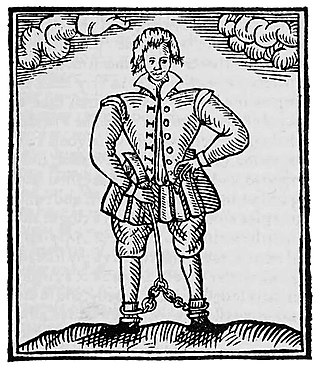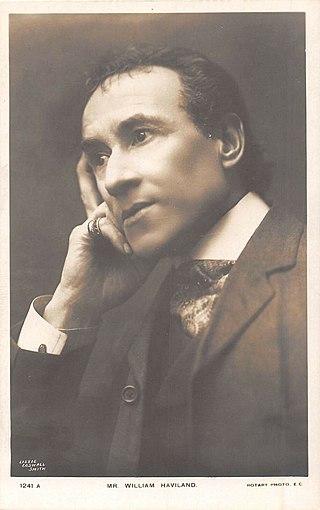
William Elderton (died 1592?) was an actor, lawyer, and prolific English ballad-writer, well known in London literary circles.

William Elderton (died 1592?) was an actor, lawyer, and prolific English ballad-writer, well known in London literary circles.
Elderton first appears as an actor playing the fourth son of the Lord of Misrule, played by George Ferrers, at the court of Edward VI during the 1552-1553 Christmas season. [1]
His son, also named William, was christened on 16 January 1548 as recorded in the parish register of St. Peter's upon Cornhill, London. His wife, Grace Clearton, was buried on 9 November 1553, in the same church, and his servant, Steven Riche, on 8 December of the same year. [2]
An early dated ballad of Elderton is The Panges of Loue and louers fttes (sic), 1559. Michael Drayton, in his epistle to Henry Reynolds, writes —
I scornd your ballet then, though it were done
And had for Finis William Elderton.
A lost book, entitled Eldertons Jestes with his mery Toyes, was licensed for publication in 1561-2 (Arber, Transcript, i. 179). It provoked 'An Admonition to Elderton to leave the toyes by him begone,' which was followed by 'Eldertons answere for his mery toyes.' Both the 'Admonition' and the 'Answer' are also lost. Among Elderton's extant ballads are
Some verses of Elderton are printed before Claudius Hollyband's Arnalt and Lucenda, 1575. John Stow in his 'Survey,' (chapter on 'Cheape Warde'), quotes some verses on the images over the Guildhall Gate, composed 'about thirty yeares since by William Elderton, at that time an Atturney in the Sheriifes Courtes there.' From A true reporte of the death and martyrdome of M. Campion, 1581, it appears that he published some 'scurile balates' on Edmund Campion's execution.
Elderton died in or before 1592. In that year Gabriel Harvey published his Foure Letters, in which he describes Elderton and Robert Greene as 'two notorious mates and the very ringleaders of the riming and scribbling crew'. He speaks in the same tract of 'Elderton's ale-crammed nose.' Thomas Nashe, in Foure Letters Confuted, 1593, upbraids Harvey for 'plucking Elderton out of the ashes of his ale,' and says that there had been a 'monstrous emulation' between Elderton and Harvey. There are two jocular epitaphs on Elderton in William Camden's Remaines, 1605, p. 56. Some of his ballads were reprinted by John Payne Collier for the Percy Society (Old Ballads from Early Printed Copies) in 1840; others are included in Ancient Ballads and Broadsides (Philobiblon Society), 1867. The opening lines of a ballad by Elderton are quoted in Much Ado about Nothing , v. 2. John Ward, in Journal of the American Musicological Society, 1957, X, p. 164 gives more detail of this song "The God of Love", as sung by Benedick in Much Ado about Nothing.

William Harvey was an English physician who made influential contributions to anatomy and physiology. He was the first known physician to describe completely, and in detail, pulmonary and systemic circulation as well as the specific process of blood being pumped to the brain and the rest of the body by the heart.
Publilius Syrus, was a Latin writer, best known for his sententiae. He was a Syrian from Antioch who was brought as a slave to Roman Italy. Syrus was brought to Rome on the same ship that brought a certain Manilius, astronomer - not the famous Manilius of the 1st century AD, and Staberius Eros the grammarian. By his wit and talent, Syrus won the favour of his master, who granted him manumission and educated him. He became a member of the Publilia gens. Publilius' name, due to the palatalization of 'l' between two 'i's in the Early Middle Ages, is often presented by manuscripts in corrupt form as 'Publius', Publius being a very common Roman praenomen.

Robert Persons, later known as Robert Parsons, was an English Jesuit priest. He was a major figure in establishing the 16th-century "English Mission" of the Society of Jesus.
This article presents lists of literary events and publications in the 16th century.
This article contains information about the literary events and publications of 1567.

Thomas Nashe was an Elizabethan playwright, poet, satirist and a significant pamphleteer. He is known for his novel The Unfortunate Traveller, his pamphlets including Pierce Penniless, and his numerous defences of the Church of England.

Gabriel Harvey was an English writer. Harvey was a notable scholar, whose reputation suffered from his quarrel with Thomas Nashe. Henry Morley, writing in the Fortnightly Review, has argued that Harvey's Latin works demonstrate that he was distinguished by qualities very different from the pedantry and conceit usually associated with his name.

"Greensleeves" is a traditional English folk song. A broadside ballad by the name "A Newe Northen Dittye of ye Ladye Greene Sleves" was registered by Richard Jones at the London Stationers' Company in September 1580, and the tune is found in several late 16th-century and early 17th-century sources, such as Ballet's MS Lute Book and Het Luitboek van Thysius, as well as various manuscripts preserved in the Seeley Historical Library in the University of Cambridge.

John Heywood was an English writer known for his plays, poems, and collection of proverbs. Although he is best known as a playwright, he was also active as a musician and composer, though no musical works survive. A devout Catholic, he nevertheless served as a royal servant to both the Catholic and Protestant regimes of Henry VIII, Edward VI, Mary I and Elizabeth I.

Elizabethan literature refers to bodies of work produced during the reign of Queen Elizabeth I (1558–1603), and is one of the most splendid ages of English literature. In addition to drama and the theatre, it saw a flowering of poetry, with new forms like the sonnet, the Spenserian stanza, and dramatic blank verse, as well as prose, including historical chronicles, pamphlets, and the first English novels. Major writers include William Shakespeare, Edmund Spenser, Christopher Marlowe, Richard Hooker, Ben Jonson, Philip Sidney and Thomas Kyd.
The Stationers' Register was a record book maintained by the Stationers' Company of London. This was a trade guild given a royal charter in 1557 to regulate the various professions associated with England's publishing industry, including printers, bookbinders, booksellers, and publishers. The company's charter gave it the right to seize illicit editions of published works and to bar the publication of unlicensed books, and allowed publishers to document their right to produce a particular printed work in the register, which thus constituted an early form of copyright law.

Much Ado About Nothing is a comedy by William Shakespeare thought to have been written in 1598 and 1599. The play was included in the First Folio, published in 1623.
Thomas Preston (1537–1598) was an English master of Trinity Hall, Cambridge, and possibly a dramatist.
William Fulwood, was an author.

Cautionary Tales for Children: Designed for the Admonition of Children between the ages of eight and fourteen years is a 1907 children's book written by Hilaire Belloc. It is a parody of the cautionary tales that were popular in the 19th century. The poems are a sardonic critique of Victorian era upper class society. The work is in the public domain in the United States.
Hyder Edward Rollins was an American scholar and English professor. He was a prolific author of articles and books on Elizabethan poetry, broadside ballads, and Romantic poets. He was an internationally recognized scholar on John Keats, and he edited the authoritative two-volume edition of Keats' letters.
Richard Harvey (1560–1630) was an English astrologer, theologian and controversialist.
Edward White was a London printer and stationer whose career spanned a period of over forty years. His shop in the booksellers' district of St Paul's Churchyard was at the Sign of the Gun, where he sold many anonymous works as well as works by Thomas Kyd, Robert Greene, Anthony Munday and Christopher Marlowe. Between 1594 and 1611 he sold all three quartos of William Shakespeare's Titus Andronicus.

William Haviland was a British actor-manager specialising in the works of Shakespeare who during his long stage career performed with some of the leading actors of his time including Henry Irving and Herbert Beerbohm Tree.
Laurence Price was a writer of ballads and pamphlets in England. His close links to the publishing trade over a period of nearly forty years make it likely that he lived in London for most, if not all, of his life. He was strongly influenced by the works of Nicholas Breton and Thomas Deloney, turning to them for inspiration at various points in his career.
![]() This article incorporates text from a publication now in the public domain : "Elderton, William". Dictionary of National Biography . London: Smith, Elder & Co. 1885–1900.
This article incorporates text from a publication now in the public domain : "Elderton, William". Dictionary of National Biography . London: Smith, Elder & Co. 1885–1900.
This article relies largely or entirely on a single source .(January 2011) |